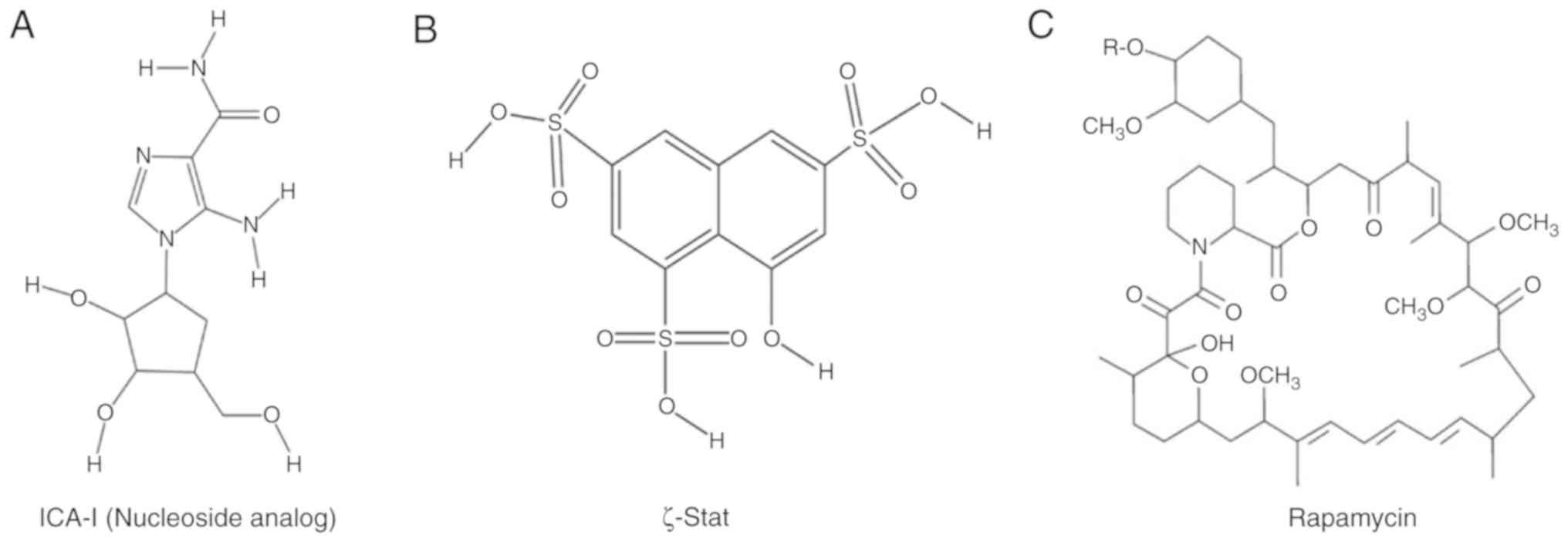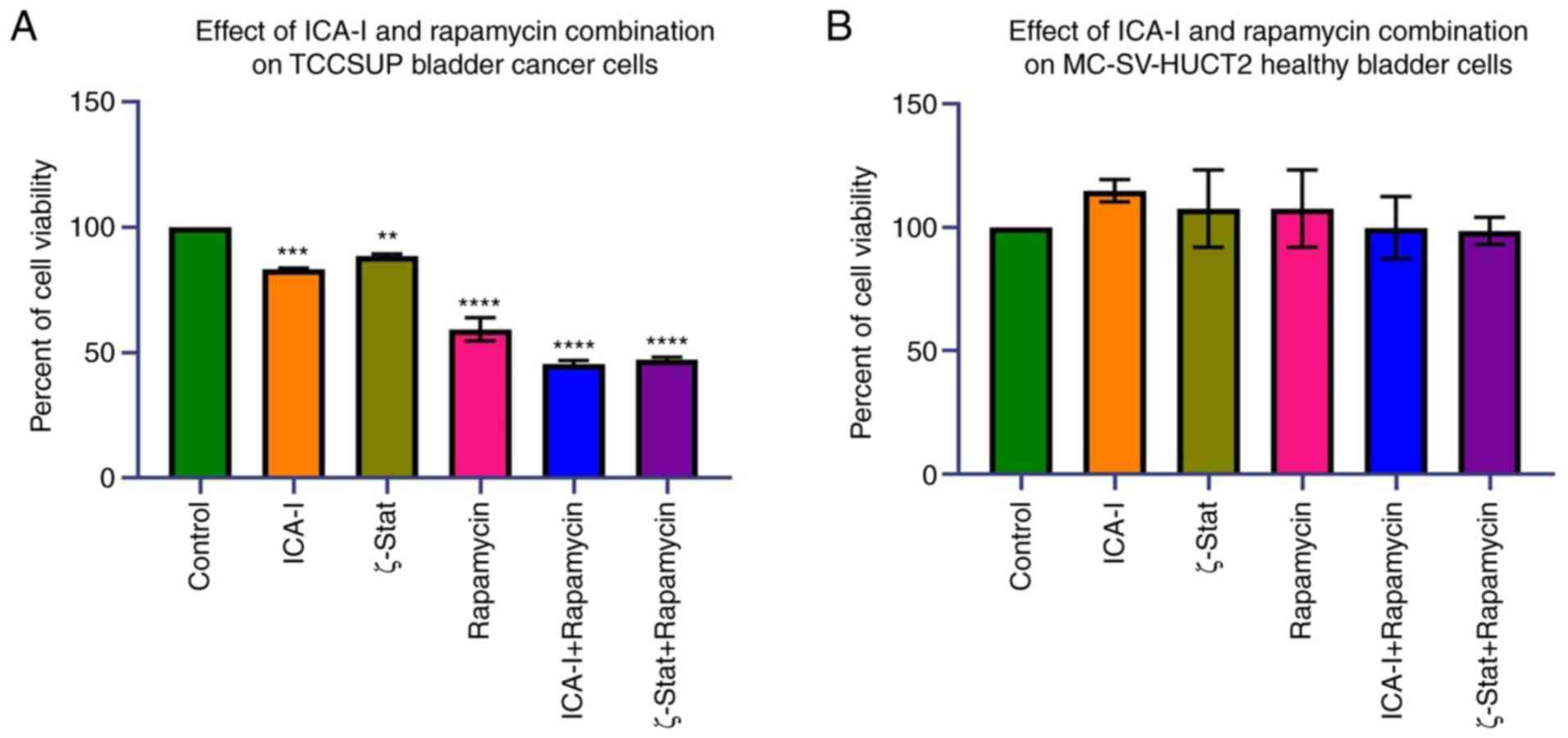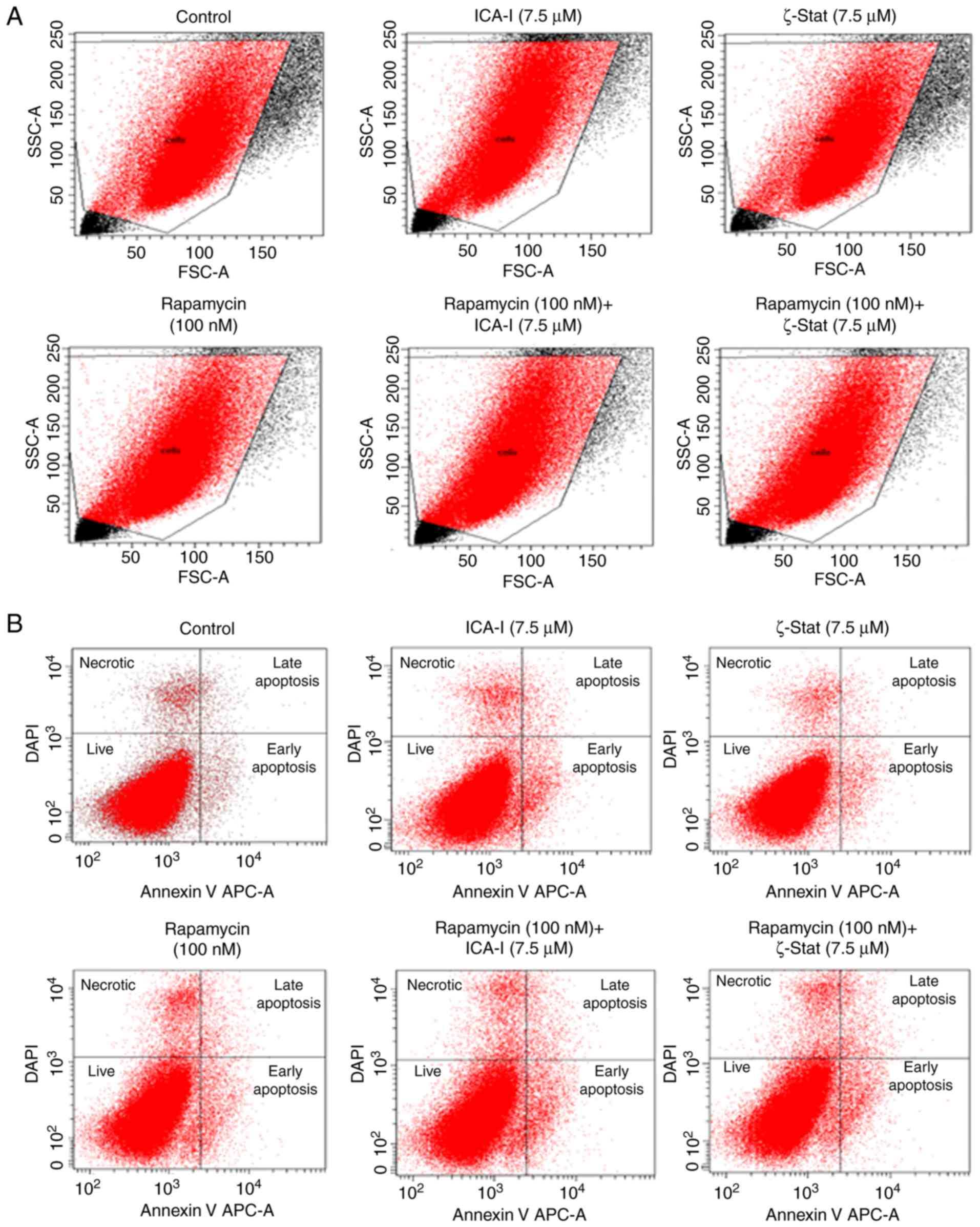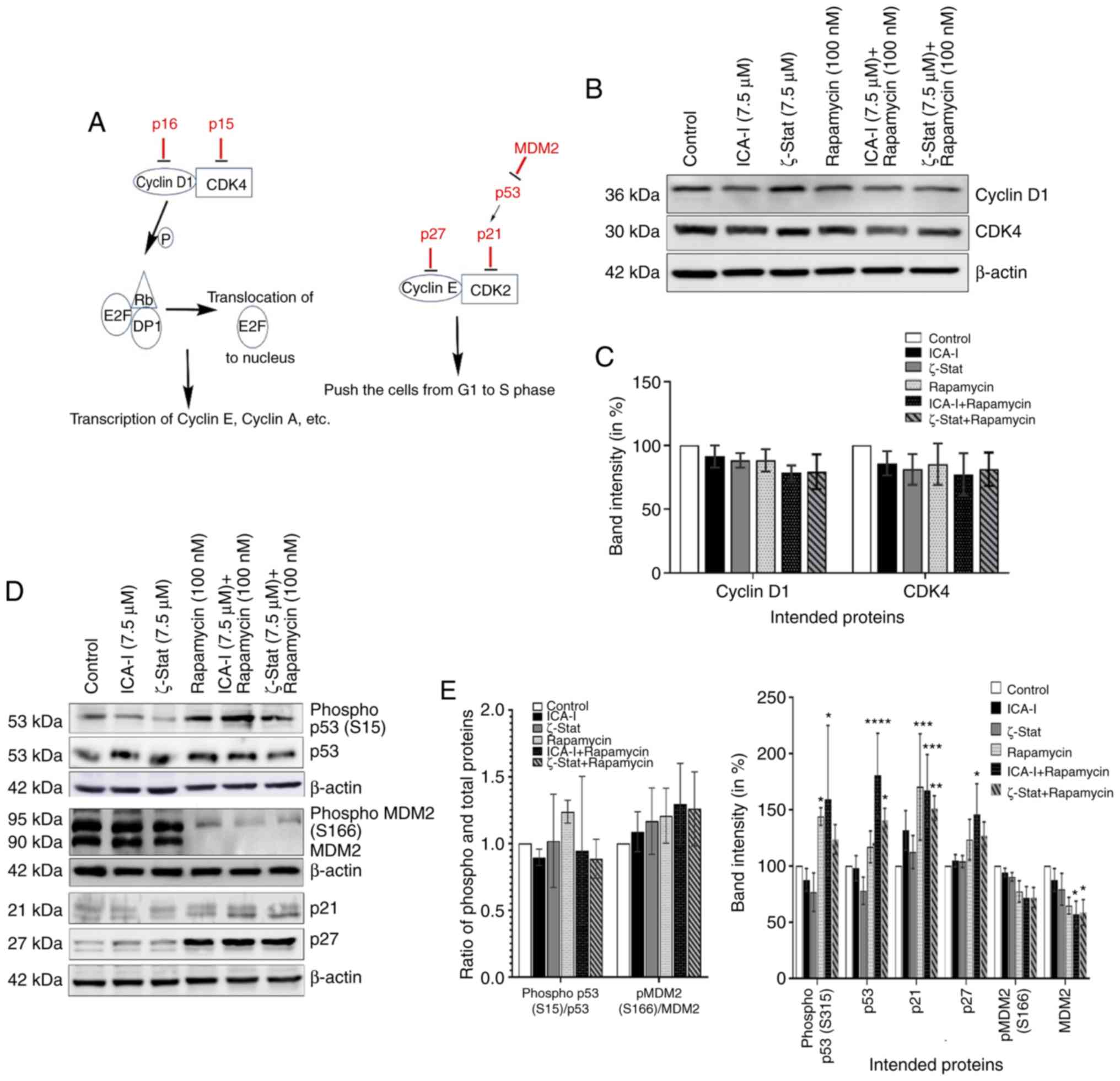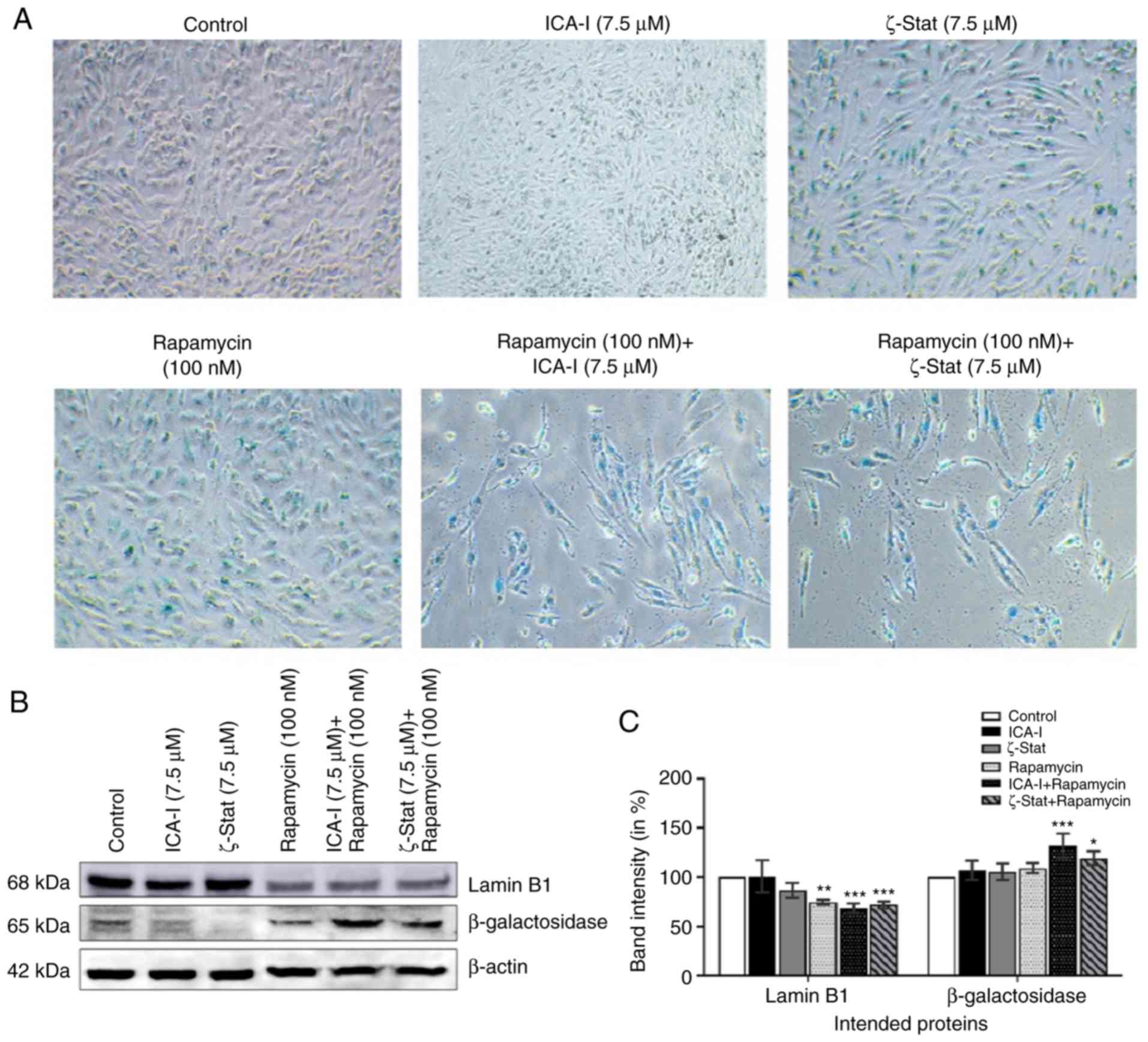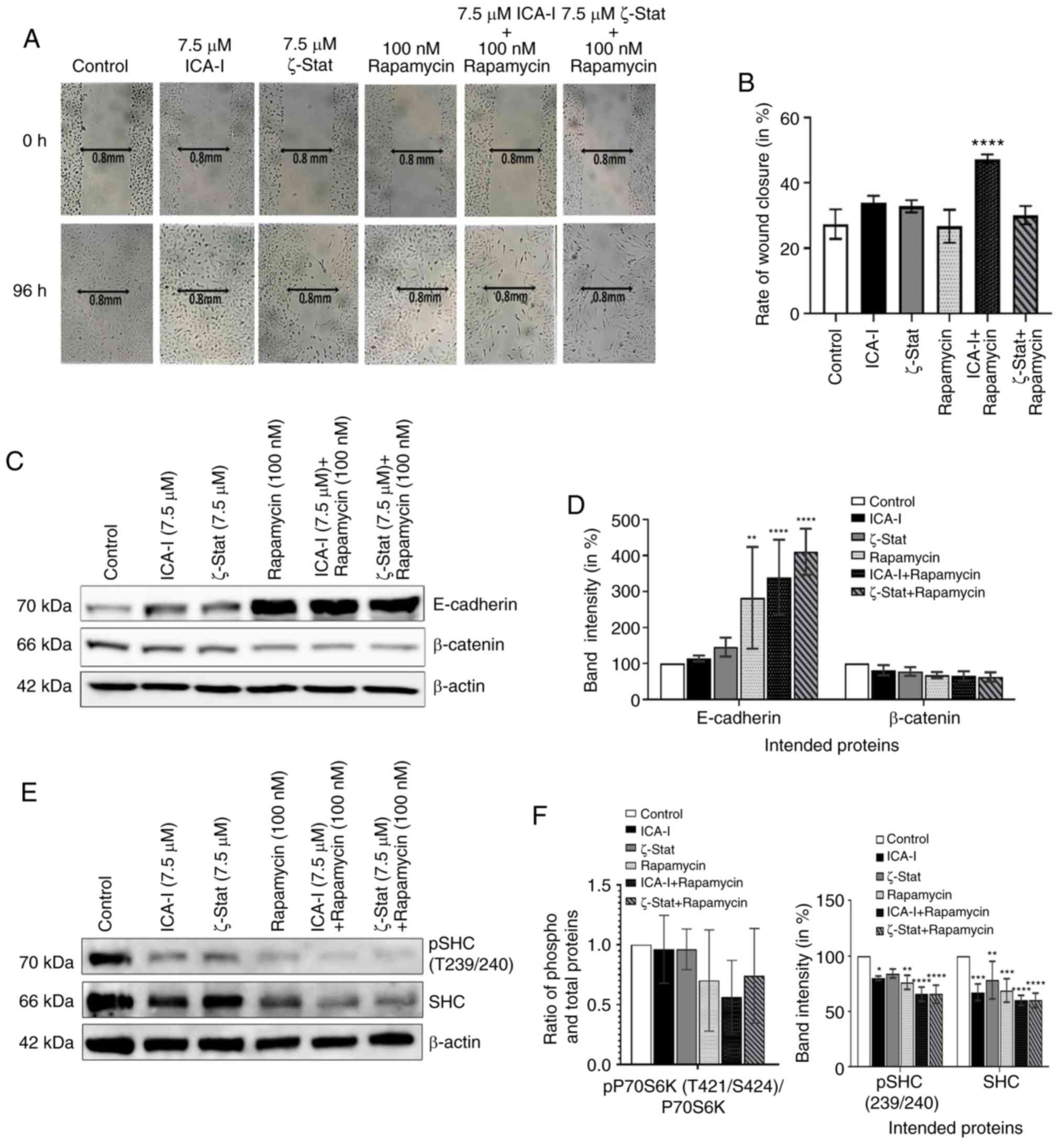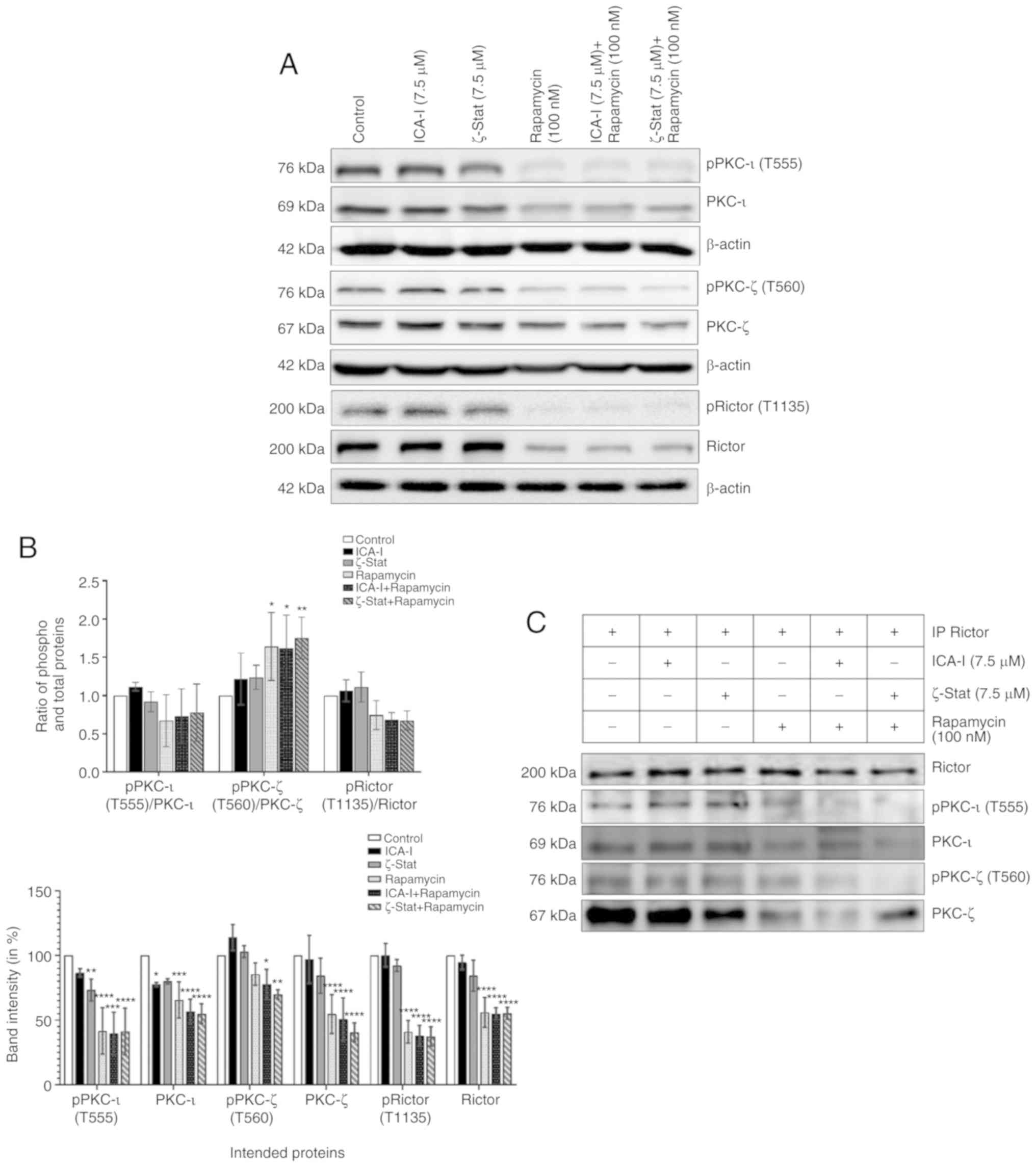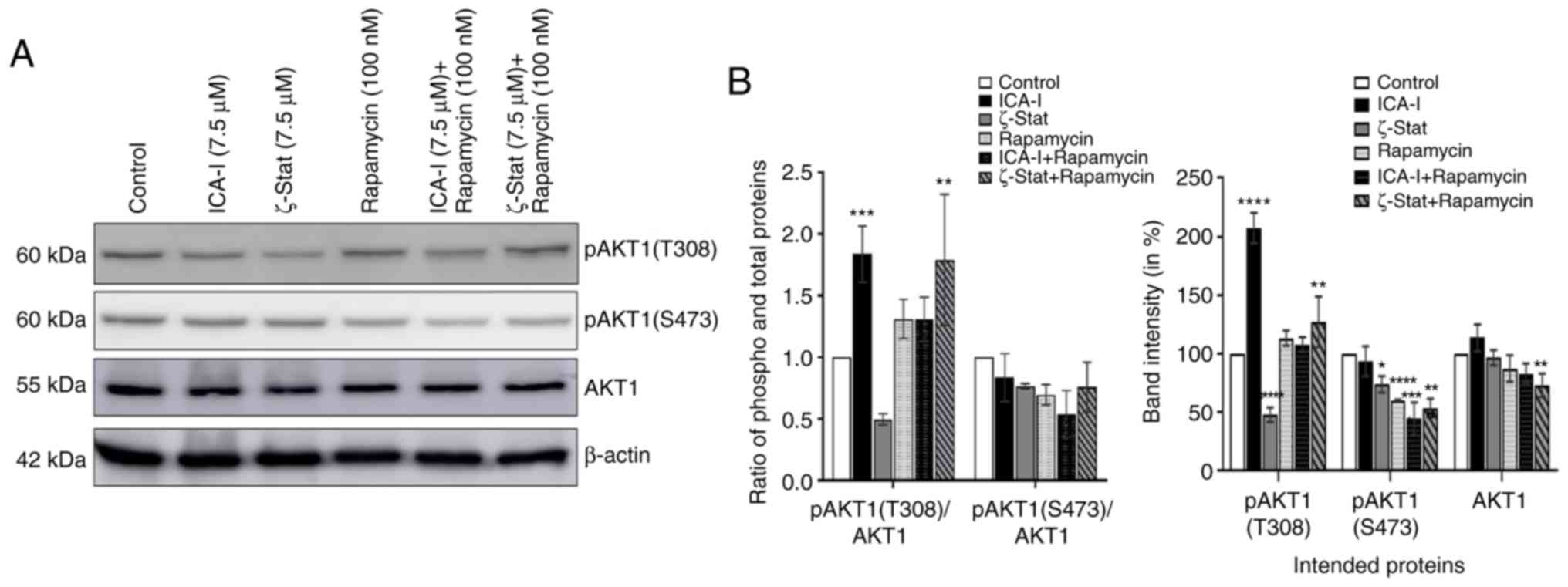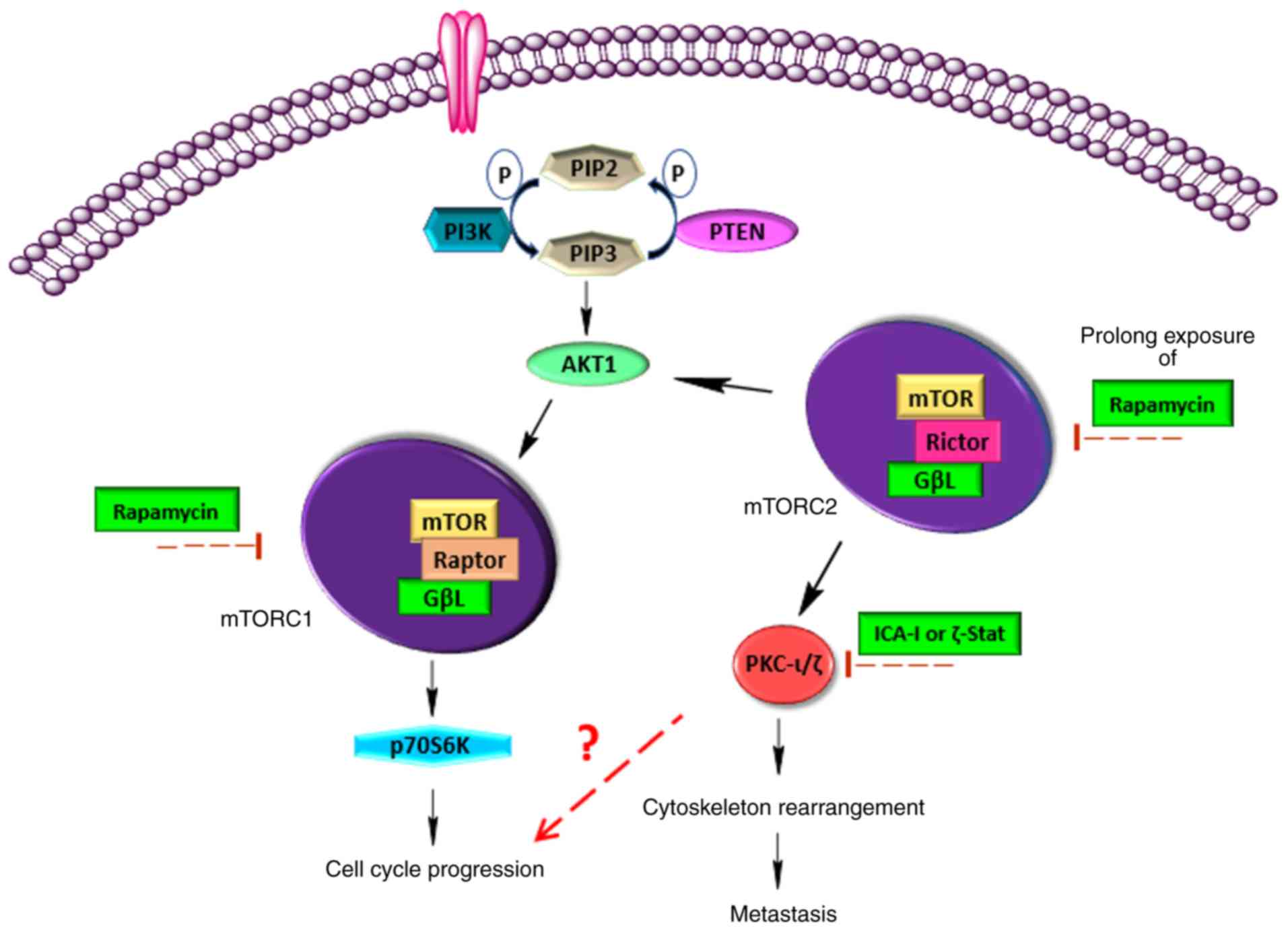|
1
|
Siegel RL, Miller KD and Jemal A: Cancer
statistics, 2019. CA Cancer J Clin. 69:7–34. 2019. View Article : Google Scholar : PubMed/NCBI
|
|
2
|
Montironi R, Cheng L, Scarpelli M and
Lopez-Beltran A: Pathology and genetics: Tumours of the urinary
system and male genital system: Clinical implications of the 4th
edition of the WHO classification and beyond. Eur Urol. 70:120–123.
2016. View Article : Google Scholar : PubMed/NCBI
|
|
3
|
Abraham S, Knapp DW, Cheng L, Snyder PW,
Mittal SK, Bangari DS, Kinch M, Wu L, Dhariwal J and Mohammed SI:
Expression of EphA2 and Ephrin A-1 in carcinoma of the urinary
bladder. Clin Cancer Res. 12:353–360. 2006. View Article : Google Scholar : PubMed/NCBI
|
|
4
|
Reuter VE: Pathology of bladder cancer:
Assessment of prognostic variables and response to therapy. Semin
Oncol. 17:524–532. 1990.PubMed/NCBI
|
|
5
|
Sylvester RJ, van der MEIJDEN AP and Lamm
DL: Intravesical bacillus Calmette-Guerin reduces the risk of
progression in patients with superficial bladder cancer: A
meta-analysis of the published results of randomized clinical
trials. J Urol. 168:1964–1970. 2002. View Article : Google Scholar : PubMed/NCBI
|
|
6
|
Gschwend JE, Dahm P and Fair WR: Disease
specific survival as endpoint of outcome for bladder cancer
patients following radical cystectomy. Eur Urol. 41:440–448. 2002.
View Article : Google Scholar : PubMed/NCBI
|
|
7
|
Nelson DL and Cox MM: Lehninger principles
of biochemistry. 5th ed. Book; pp. 1–1294. 2008
|
|
8
|
Islam SMA, Patel R and Acevedo-Duncan M:
Protein Kinase C-ζ stimulates colorectal cancer cell carcinogenesis
via PKC-ζ/Rac1/Pak1/β-Catenin signaling cascade. Biochim Biophys
Acta Mol cell Res. 1865:650–664. 2018. View Article : Google Scholar : PubMed/NCBI
|
|
9
|
Islam SMA, Patel R, Bommareddy RR, Khalid
KM and Acevedo-Duncan M: The modulation of actin dynamics via
atypical Protein Kinase-C activated Cofilin regulates metastasis of
colorectal cancer cells. Cell Adh Migr. 13:106–120. 2019.
View Article : Google Scholar :
|
|
10
|
Shaw RJ and Cantley LC: Ras, PI(3)K and
mTOR signalling controls tumour cell growth. Nature. 441:424–430.
2006. View Article : Google Scholar : PubMed/NCBI
|
|
11
|
Liu P, Cheng H, Roberts TM and Zhao JJ:
Targeting the phos-phoinositide 3-kinase pathway in cancer. Nat Rev
Drug Discov. 8:627–644. 2009. View
Article : Google Scholar : PubMed/NCBI
|
|
12
|
Sengupta S, Peterson TR and Sabatini DM:
Regulation of the mTOR complex 1 pathway by nutrients, growth
factors, and stress. Mol Cell. 40:310–322. 2010. View Article : Google Scholar : PubMed/NCBI
|
|
13
|
Laplante M and Sabatini DM: mTOR signaling
in growth control and disease. Cell. 149:274–293. 2012. View Article : Google Scholar : PubMed/NCBI
|
|
14
|
Facchinetti V, Ouyang W, Wei H, Soto N,
Lazorchak A, Gould C, Lowry C, Newton AC, Mao Y, Miao RQ, et al:
The mammalian target of rapamycin complex 2 controls folding and
stability of Akt and protein kinase C. EMBO J. 27:1932–1943. 2008.
View Article : Google Scholar : PubMed/NCBI
|
|
15
|
Ikenoue T, Inoki K, Yang Q, Zhou X and
Guan KL: Essential function of TORC2 in PKC and Akt turn motif
phosphorylation, maturation and signalling. EMBO J. 27:1919–1931.
2008. View Article : Google Scholar : PubMed/NCBI
|
|
16
|
Sarbassov DD, Guertin DA, Ali SM and
Sabatini DM: Phosphorylation and regulation of Akt/PKB by the
rictor-mTOR complex. Science. 307:1098–1101. 2005. View Article : Google Scholar : PubMed/NCBI
|
|
17
|
Eder AM, Sui X, Rosen DG, Nolden LK, Cheng
KW, Lahad JP, Kango-Singh M, Lu KH, Warneke CL, Atkinson EN, et al:
Atypical PKC contributes to poor prognosis through loss of
apical-basal polarity and Cyclin E overexpression in ovarian
cancer. Proc Natl Acad Sci. 102:12519–12524. 2005. View Article : Google Scholar
|
|
18
|
Guo H, Ma Y, Zhang B, Sun B, Niu R, Ying G
and Zhang N: Pivotal Advance: PKC is required for migration of
macrophages. J Leukoc Biol. 85:911–918. 2009. View Article : Google Scholar : PubMed/NCBI
|
|
19
|
Smalley T, Islam SMA, Apostolatos C,
Apostolatos A and Acevedo-Duncan M: Analysis of PKC-ζ protein
levels in normal and malignant breast tissue subtypes. Oncol Lett.
17:1537–1546. 2019.PubMed/NCBI
|
|
20
|
Islam SMA, Dey A and Acevedo-Duncan M:
Abstract 719: Combination of atypical protein kinase-C inhibitor
and 5-fluo-rouracil retards the proliferation of colorectal cancer
cells. Mol Cell Biol. 719:2019.
|
|
21
|
Mosmann T: Rapid colorimetric assay for
cellular growth and survival: Application to proliferation and
cytotoxicity assays. J Immunol Methods. 65:55–63. 1983. View Article : Google Scholar : PubMed/NCBI
|
|
22
|
Bradford MM: A rapid and sensitive method
for the quantitation of microgram quantities of protein utilizing
the principle of protein-dye binding. Anal Biochem. 72:248–254.
1976. View Article : Google Scholar : PubMed/NCBI
|
|
23
|
Patel R, Win H, Desai S, Patel K, Matthews
JA and Acevedo-Duncan M: Involvement of PKC-ι in glioma
proliferation. Cell Prolif. 41:122–135. 2008. View Article : Google Scholar : PubMed/NCBI
|
|
24
|
Sherr CJ and Roberts JM: Living with or
without cyclins and cyclin-dependent kinases. Genes Dev.
18:2699–2711. 2004. View Article : Google Scholar : PubMed/NCBI
|
|
25
|
Hardie DG and Hanks S: The protein kinase
factsbook. Academic Press; 1995
|
|
26
|
Kriegmair MC, Balk M, Wirtz R, Steidler A,
Weis CA, Breyer J, Hartmann A, Bolenz C and Erben P: Expression of
the p53 inhibitors mdm2 and mdm4 as outcome predictor in
muscle-invasive bladder cancer. Anticancer Res. 36:5205–5213. 2016.
View Article : Google Scholar : PubMed/NCBI
|
|
27
|
Wang AS, Ong PF, Chojn owski A, Clavel C
and Dreesen O: Loss of lamin B1 is a biomarker to quantify cellular
senescence in photoaged skin. Sci Rep. 7:156782017. View Article : Google Scholar : PubMed/NCBI
|
|
28
|
Goldstein S: Replicative senescence: The
human fibroblast comes of age. Science. 249:1129–1133. 1990.
View Article : Google Scholar : PubMed/NCBI
|
|
29
|
Wheelock MJ and Johnson KR: Cadherins as
Modulators of Cellular Phenotype. Annu Rev Cell Dev Biol.
19:207–235. 2003. View Article : Google Scholar : PubMed/NCBI
|
|
30
|
De P, Carlson JH, Wu H, Marcus A,
Leyland-Jones B and Dey N: Wnt-beta-catenin pathway signals
metastasis-associated tumor cell phenotypes in triple negative
breast cancers. Oncotarget. 7:43124–43149. 2016. View Article : Google Scholar : PubMed/NCBI
|
|
31
|
Mauro L, Sisci D, Bartucci M, Salerno M,
Kim J, Tam T, Guvakova MA, Ando S and Surmacz E: SHC-α5β1 integrin
interactions regulate breast cancer cell adhesion and motility. Exp
Cell Res. 252:439–448. 1999. View Article : Google Scholar : PubMed/NCBI
|
|
32
|
Jackson JG, Yoneda T, Clark GM and Yee D:
Elevated levels of p66 Shc are found in breast cancer cell lines
and primary tumors with high metastatic potential. Clin Cancer Res.
6:1135–1139. 2000.PubMed/NCBI
|
|
33
|
Xiao L, Wang YC, Li WS and Du Y: The role
of mTOR and phospho-p70S6K in pathogenesis and progression of
gastric carcinomas: An immunohistochemical study on tissue
micro-array. J Exp Clin Cancer Res. 28:1522009. View Article : Google Scholar
|
|
34
|
Malley CO and Pidgeon GP: The mTOR pathway
in obesity driven gastrointestinal cancers: Potential targets and
clinical trials. BBA Clin. 5:29–40. 2016. View Article : Google Scholar : PubMed/NCBI
|
|
35
|
Ching CB and Hansel DE: Expanding
therapeutic targets in bladder cancer: The PI3K/Akt/mTOR pathway.
Lab Invest. 90:1406–1414. 2010. View Article : Google Scholar : PubMed/NCBI
|
|
36
|
Carneiro BA, Meeks JJ, Kuzel TM, Scaranti
M, Abdulkadir SA and Giles FJ: Emerging therapeutic targets in
bladder cancer. Cancer Treat Rev. 41:170–178. 2015. View Article : Google Scholar
|
|
37
|
Apostolatos AH, Ratnayake WS, Win-Piazza
H, Apostolatos CA, Smalley T, Kang L, Salup R, Hill R and
Acevedo-Duncan M: Inhibition of atypical protein kinase C-ι
effectively reduces the malignancy of prostate cancer cells by
downregulating the NF-κB signaling cascade. Int J Oncol.
53:1836–1846. 2018.PubMed/NCBI
|
|
38
|
Ratnayake WS, Apostolatos AH, Ostrov DA
and Acevedo-Duncan M: Two novel atypical PKC inhibitors; ACPD and
DNDA effectively mitigate cell proliferation and epithelial to
mesenchymal transition of metastatic melanoma while inducing
apoptosis. Int J Oncol. 51:1370–1382. 2017. View Article : Google Scholar : PubMed/NCBI
|
|
39
|
Pinto-Leite R, Arantes-Rodrigues R, Sousa
N, Oliveira PA and Santos L: mTOR inhibitors in urinary bladder
cancer. Tumor Biol. 37:11541–11551. 2016. View Article : Google Scholar
|
|
40
|
Alayev A, Salamon RS, Schwartz NS, Berman
AY, Wiener SL and Holz MK: Combination of rapamycin and resveratrol
for treatment of bladder cancer. J Cell Physiol. 232:436–446. 2017.
View Article : Google Scholar
|
|
41
|
Alayev A, Berger SM, Kramer MY, Schwartz
NS and Holz MK: The combination of rapamycin and resveratrol blocks
autophagy and induces apoptosis in breast cancer cells. J Cell
Biochem. 116:450–547. 2015. View Article : Google Scholar :
|
|
42
|
Islam SMA, Dey A, Patel R, Smalley T and
Acevedo-Duncan M: Atypical Protein Kinase-C inhibitors exhibit a
synergistic effect in facilitating DNA damaging effect of
5-fluorouracil in colorectal cancer cells. Biomed Pharmacother.
120:1096652020. View Article : Google Scholar
|
|
43
|
Orlando DA, Lin CY, Bernard A, Wang JY,
Socolar JE, Iversen ES, Hartemink AJ and Haase SB: Global control
of cell-cycle transcription by coupled CDK and network oscillators.
Nature. 453:944–947. 2008. View Article : Google Scholar : PubMed/NCBI
|
|
44
|
Levin VA, Panchabhai SC, Shen L, Kornblau
SM, Qiu Y and Baggerly KA: Different changes in protein and
phosphoprotein levels result from serum starvation of high-grade
glioma and adenocarcinoma cell lines. J Proteome Res. 9:179–191.
2010. View Article : Google Scholar
|
|
45
|
Ballou LM and Lin RZ: Rapamycin and mTOR
kinase inhibitors. J Chem Biol. 1:27–36. 2008. View Article : Google Scholar
|















